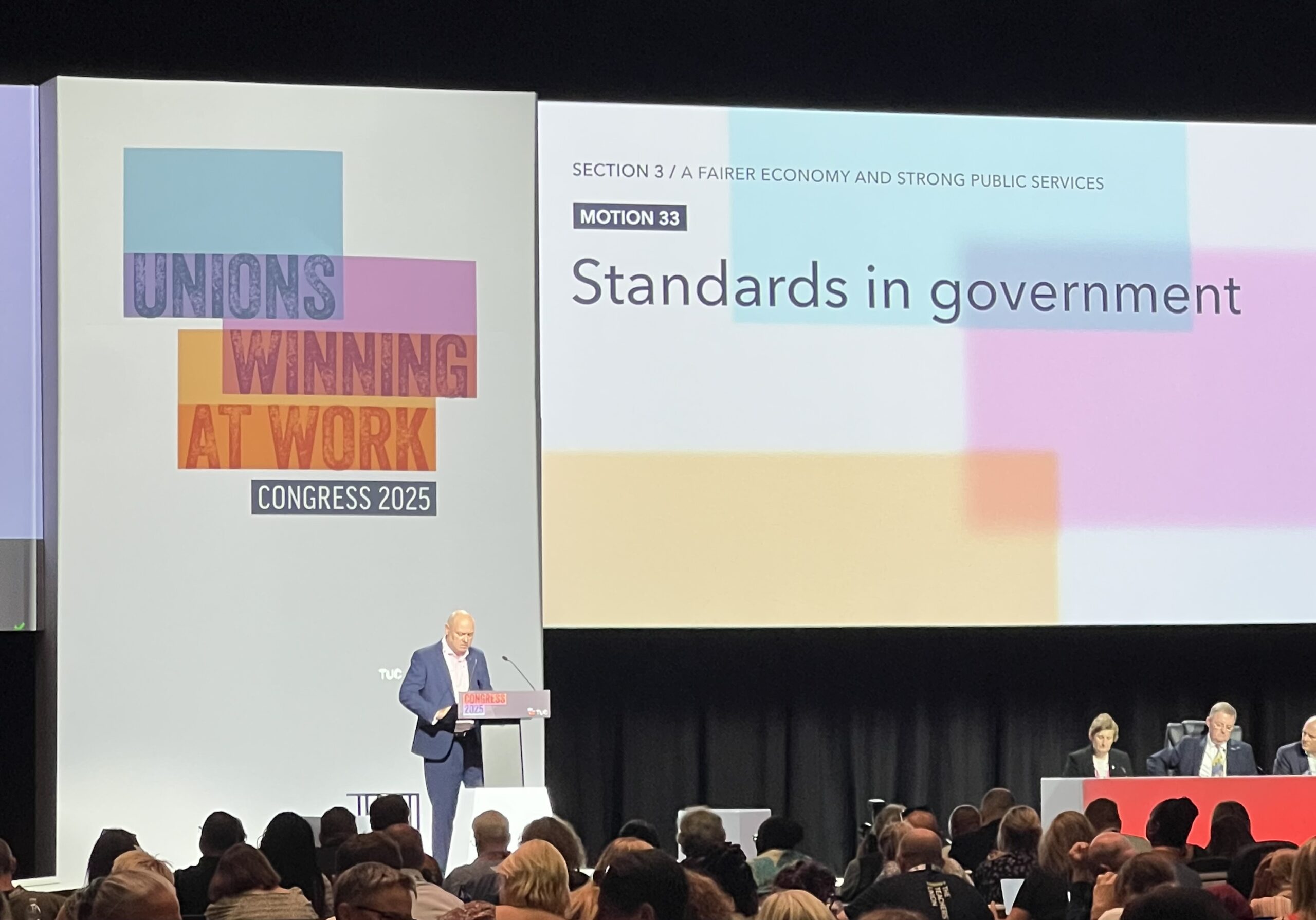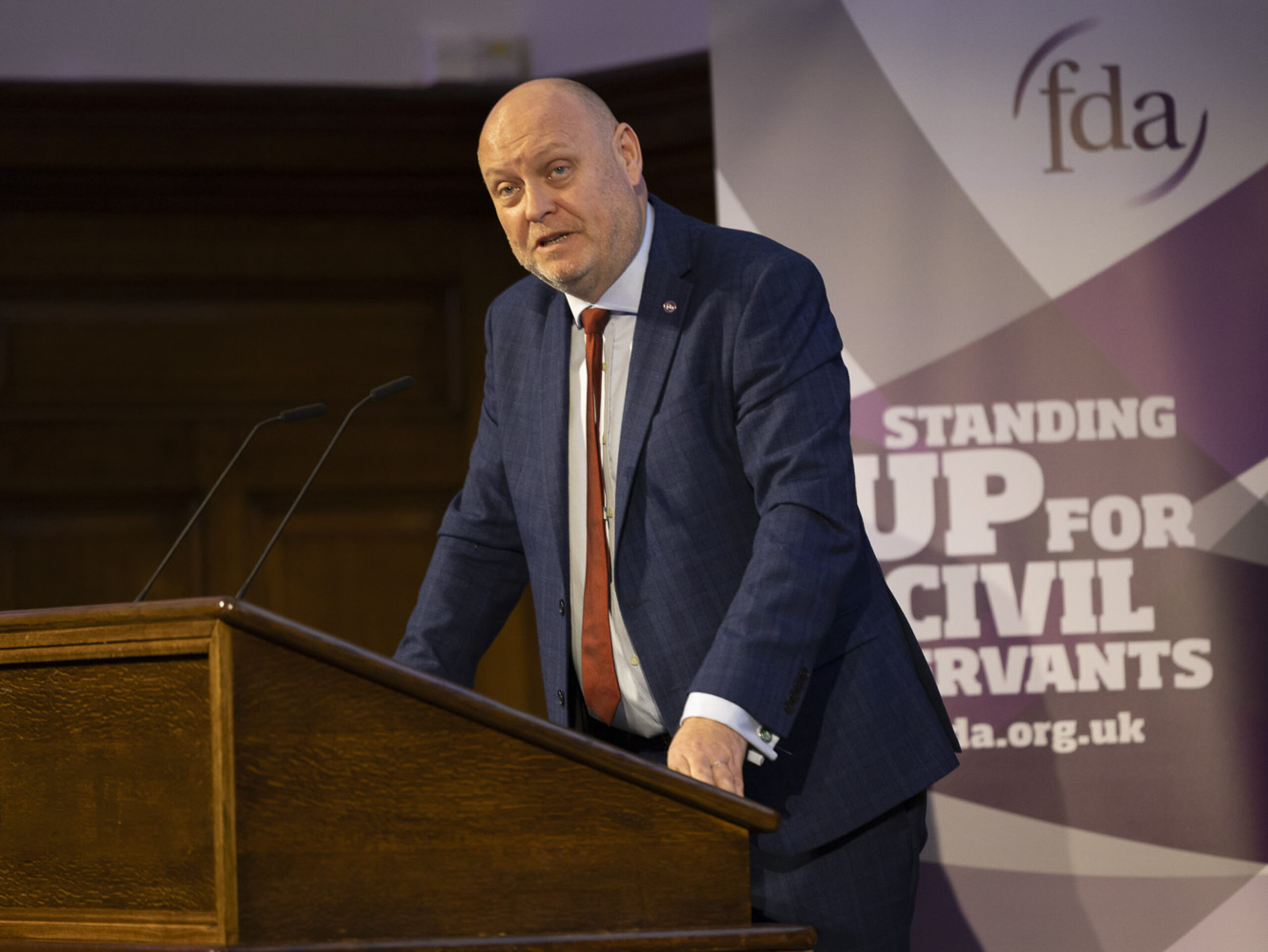The show must go on

Nick Perry has led Northern Ireland’s Department of Justice (DoJ) since it was set up in 2010 – so this experienced public servant has certainly been around the block. But, as the unprecedented political impasse at Stormont continues, the DoJ’s Permanent Secretary tells Public Service Magazine that he’s never seen anything quite like it. “It’s the first time, not only in the ten years or so since devolution, but really in my 36 years in the civil service, where we’ve been in a position of having no direct political authority.”
For almost a year now, there has been no functioning executive in Northern Ireland. A bitter row over the handling of the region’s controversial Renewable Heat Incentive (RHI) scheme led to a collapse in the power-sharing deal between the assembly’s two largest parties – Sinn Féin and the Democratic Unionist Party – back in January 2017. Despite fresh elections to the Stormont Assembly in March, and an intensive round of talks aimed at finding common ground, that deadlock continues, while a major inquiry into the RHI scheme itself is now underway.
If that wasn’t enough, the Northern Ireland Civil Service (NICS) must also, in the absence of ministers, get to grips with the manifold complexities of preparing for the UK’s exit from the European Union, a decision with major implications for the region – not least because of its geographical proximity to another EU member state.
As well as this hefty policy workload, the 23,000 officials in the Northern Ireland Civil Service (NICS) must keep the region’s public services running as they await the return of ministers – to ensure, as far as possible, that it’s business as usual in Northern Ireland.
Claire Archbold, the interim head of Northern Ireland’s Departmental Solicitor’s Office (DSO), tells PSM that managing what remains “a very young set of institutions” in the region means that adaptability in complex times is very much in the NICS’s blood. “Everything is uncharted territory. I think one of the skills that the Northern Ireland Civil Service has, in my experience, is of being able to step up to the mark and continue to deliver – no matter what the circumstances.”
“We decided to spend money we didn’t have at the time – you have to take proportionate action.”
– Peter May
With no ministers to direct them, senior officials across the NICS have to use their judgement to try to ensure continuity. The 2016-2021 Draft Programme for Government, drawn up before the administration fell, has given them a sense of direction, while Archbold and her colleagues have been on hand to help departments navigate some of the tricky constitutional questions thrown up by the current situation. “In a sense our role hasn’t really changed, because we’re there to provide legal counsel and support to departments as well as ministers,” she explains.
Archbold acknowledges that the DSO has been “very, very busy” of late, not just with providing that ongoing support to departments, but also advising them on the legal implications of their Brexit-focused projects – “a really big, chunky area of work” – and on their participation in the RHI inquiry. Meanwhile, she says, the day-to-day business of running a major public sector organisation has to continue. Indeed, on the day PSM spoke to Archbold, the Government Legal Service has just published an extensive review of legal grading to make sure the support DSO provides is “absolutely optimum for whenever the institutions are fully up and running again”.
In some areas, pressing ahead with the previous administration’s priorities has proven relatively straightforward, as Peter May, the Permanent Secretary at the Department for Infrastructure (DfI), explains. “The starting point is that we look at what the outgoing executive and our outgoing minister had set us as policy directions, and we try to continue to implement those,” he tells PSM. May, whose organisation’s broad remit covers everything from roads and rail to major planning applications, points out that the “long-term game” of managing big infrastructure projects has been to his department’s advantage at a time of political uncertainty.
“Prior to the executive falling, they had identified four ‘flagship projects’ which our department was responsible for. The importance of having those flagship projects is that it guarantees multi-annual funding for the programme. We’ve been working on a succession of one-year budgets, which creates challenges. If we know that, in principle, come what may, these projects will be prioritised, that allows us to get on and go after them even in the absence of ministers. There’s a clear direction of travel.”
“Everything is uncharted territory – the NICS has the skills to step up to the mark.”
– Claire Archbold
DoJ’s Nick Perry says his department has been fortunate in having had two previous ministers – David Ford and Claire Sugden – who set out clear justice policy priorities before leaving post. He also points out that large parts of the justice system benefit from a degree of separation from politics that allows them to continue to run without ministers. “One of the features of the justice system, as opposed to some other parts of government, is we have major constitutionally independent players which continue to perform their functions,” he says. “The chief constable, the Lord Chief Justice, the Director of Public Prosecutions, and to an extent, prisons and the Youth Justice Agency carry out their statutory functions in a normal way.”
In other areas, the ongoing lack of political direction has required officials to make some tough calls. At the end of August 2017, for example, the north-west of Northern Ireland was hit by major flooding, leaving bridges, roads and flood defences badly damaged as nearly two-thirds of the average rainfall for August poured down in just nine hours.
“We took the decision here that we needed to start to spend money that we didn’t have at that time to try and repair those roads, bridges and flood defences, and then to put the necessary budget in place with support from colleagues in the Department of Finance thereafter,” the says DfI chief Peter May. “Normally resource allocation would be something that ministers would very much take the lead on in our system. But when you’re faced with circumstances that are unforeseeable, I think you have to take proportionate action.”
May is clear that, had any minister been in post during the floods, they “would have wanted to fix that damage immediately – that’s the basis on which I took our decisions here”. But he acknowledges that he and his colleagues are now in “constitutionally uncharted territory”, as they make careful judgements on the kind of matters that would usually be the job of elected politicians. “All of our careers are spent preparing and supporting ministers in their activity,” he says. “So to go without ministers for this period is really very strange indeed, and it gives rise to all sorts of challenges.”
Speaking in late 2017, Northern Ireland Secretary James Brokenshire paid tribute to the region’s civil servants, saying they had shown the “utmost professionalism in protecting and preserving public services throughout these difficult times”. The comments came as Brokenshire took the extraordinary step of setting a budget for the Northern Ireland from Westminster, although he was keen to stress it reflected the “departmental allocations and ambits that have been recommended by the Northern Ireland Civil Service” and did not represent a return to what would be politically-contentious direct rule from London.
“We’re reaching the point where strategic decisions have to made – people must be able to plan.”
– Nick Perry
“Without further action, by the end of November there are manifest risks that the NICS would simply begin to run out of resources,” Brokenshire told MPs. “That would mean no funding available for public services, with all of the negative impacts that would accompany such a cliff edge. No government could simply stand by and allow that to happen.”
The move to impose a budget means that those running Northern Ireland’s departments can now operate with a greater degree of financial certainty while political talks on resolving the impasse at Stormont continue. But in some cases, the political vacuum continues to have consequences: choosing who to appoint to run key public sector organisations, for example, is a job for elected politicians; without them, some key organisations are now being led by interims.
In the DoJ’s area of work, meanwhile, the Policing Board – which scrutinises the work of the Northern Ireland Police Service – requires political members to function and so cannot operate without the Executive and Assembly in place.
Permanent secretary Nick Perry is clear-eyed about the challenges that the continued suspension of power-sharing is likely to present to the NICS. “It’s not a matter of either willingness or competence. It is a matter of the authority and legitimacy to take strategic decisions and set budgets for next year and succeeding years. We’re reaching the point where those sorts of decisions are going to have to be made because people have to be able to plan.”
It remains to be seen how the crisis in Northern Ireland’s politics will unfold and, while the immediate focus is on restoring power-sharing, it’s clear that the return of an Executive will not magic away the major challenges facing the NICS in the years ahead – whether that’s Brexit, the RHI inquiry or the continued drive to deliver high quality public services in an era of tightly constrained resources.
But, whatever 2018 holds for the service, all three leaders we spoke to are clear that their organisations stand ready to serve. “The people I have the good fortune to work with are really committed and professional,” says Perry. “That’s the same both within this department, in the wider civil service, and also in the police, the judiciary and elsewhere. And so it’s a pleasure to come to work; it’s a privilege to come to work, really.”
May tells PSM he has received “a lot of support from colleagues within the department, from my peers and from the head of the Northern Ireland Civil Service, David Sterling”. He adds: “You know, there’s a strong public service spirit that sustains us all through this.” For Claire Archbold at the DSO, meanwhile, the last few months have provided a sharp reminder of just why, amid the intense focus on Northern Ireland’s “high politics”, her colleagues’ commitment to their work is so important for the region.
“A lot of us in Northern Ireland, when we were thinking about where we were going to have our career, had the choice to go to England or somewhere else,” she says. “And we didn’t – we stayed. For a lot of people, I think that’s because we wanted to be part of the solution in this place. For me, that’s what the business of government is about – continuing to deliver public services for people here.”
Related News
-

“Significant gaps” in current Northern Ireland standards regime, says Murtagh
FDA National Officer for Northern Ireland Robert Murtagh has called for a strengthened standards regime in Northern Ireland government.
-

FDA delegation attends TUC Congress 2025
This week, the FDA attended the 2025 TUC Congress in Brighton. FDA delegates spoke to and moved motions on a range of topics, including standards in government, public sector productivity, resilience, neurodiversity in the workplace, and TUC reform.
-

Ministers must “step up to the plate” or risk undermining the civil service, says Penman
The FDA has defended the pay and pensions of senior civil servants and called for ministers to do more to defend the civil service.